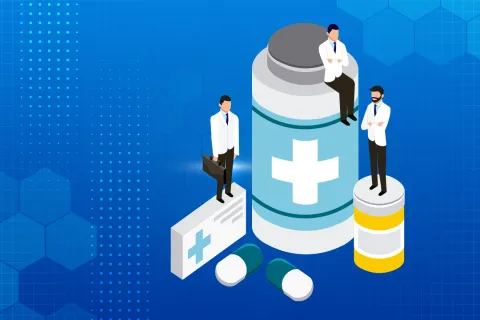
In today's digital age, the pharmaceutical industry faces many cyber threats. These threats jeopardize sensitive patient data and intellectual property and pose significant risks to Regulatory compliance and operational integrity. Understanding the cyber threat landscape and implementing robust compliance, audit, and validation services is essential for pharma companies to safeguard their assets and maintain trust in their operations.
The Evolving Cyber Threat Landscape
The healthcare sector has become a prime target for cybercriminals due to the vast amounts of valuable data it holds. Patient records, clinical trial information, proprietary research, and pharmaceutical formulations are all highly sought after by malicious actors. The cyber threat landscape in healthcare includes:
- Ransomware Attacks: Ransomware is one of the most prevalent threats, where attackers encrypt critical data and demand a ransom for its release. These attacks can paralyze healthcare operations and result in significant financial losses.
- Data Breaches: Unauthorized access to sensitive patient data and proprietary information can lead to data breaches, exposing confidential information and damaging the reputation of healthcare organizations.
- Phishing and Social Engineering: Cybercriminals often use phishing emails and social engineering tactics to deceive employees into revealing sensitive information or downloading malware.
- Insider Threats: Employees or contractors with access to sensitive data can intentionally or unintentionally cause data breaches or other security incidents.
- Advanced Persistent Threats (APTs): APTs involve prolonged and targeted cyberattacks aimed at stealing data or disrupting operations. These attacks are often carried out by well-funded and skilled adversaries.
Importance of Compliance in Cybersecurity
Regulatory compliance is critical in protecting the healthcare sector from cyber threats. Pharmaceutical companies must adhere to stringent regulations such as the Health Insurance Portability and Accountability Act (HIPAA), General Data Protection Regulation (GDPR), and various local laws governing data protection and privacy. Compliance ensures that organizations implement necessary safeguards to protect sensitive data and maintain the integrity of their operations.
- HIPAA: In the United States, HIPAA mandates strict guidelines for protecting patient information. Non-compliance can result in hefty fines and legal consequences.
- GDPR: The GDPR regulates data protection and privacy for individuals within the European Union. It imposes severe penalties for non-compliance, emphasizing the importance of robust data protection measures.
- FDA Regulations: The U.S. Food and Drug Administration (FDA) provides guidelines for ensuring the security of electronic records and systems in the pharmaceutical industry.
Audit Services: Ensuring Cybersecurity Compliance
Regular audits are essential for identifying vulnerabilities and ensuring compliance with Regulatory requirements. Audit services in the pharmaceutical sector focus on assessing the effectiveness of cybersecurity measures and identifying areas for improvement. Key components of audit services include:
- Risk Assessment: Evaluating potential threats and vulnerabilities to determine the level of risk and prioritize mitigation efforts.
- Policy Review: Assessing existing cybersecurity policies and procedures to ensure they align with Regulatory requirements and industry best practices.
- Access Control: Reviewing access controls to ensure that only authorized personnel access sensitive data and systems.
- Incident Response: Evaluating the effectiveness of incident response plans and ensuring the organization is prepared to respond to and recover from cyber incidents.
- Employee Training: Assessing the efficacy of cybersecurity training programs to ensure employees are aware of potential threats and how to mitigate them.
Validation Services: Ensuring System Integrity
Validation services are crucial for ensuring that systems and processes in the pharmaceutical industry operate as intended and comply with Regulatory requirements. These services help verify that systems are secure, reliable, and capable of protecting sensitive data. Vital aspects of validation services include:
- System Testing: Conduct rigorous systems testing to identify vulnerabilities and ensure they meet security standards.
- Data Integrity: Ensuring data accuracy, consistency, and reliability throughout its lifecycle.
- Compliance Validation: Verifying that systems and processes comply with relevant regulations and industry standards.
- Change Management: Ensuring that changes to systems and processes do not introduce new vulnerabilities or compromise security.
- Continuous Monitoring: Implementing continuous monitoring to detect and respond to potential security incidents in real time.
Conclusion
The cyber threat landscape in the healthcare sector, particularly in the pharmaceutical industry, is complex and ever evolving. Compliance, audit, and validation services are essential for protecting sensitive data, ensuring Regulatory compliance, and maintaining the integrity of operations. By implementing robust cybersecurity measures and regularly assessing their effectiveness, pharmaceutical companies can safeguard their assets, protect patient data, and maintain trust in their operations.
As cyber threats continue to grow, healthcare organizations must stay vigilant and proactive in their approach to cybersecurity. Contact Freyr today to learn more about our comprehensive compliance, audit, and validation services designed to protect your organization from cyber threats and ensure Regulatory compliance.









